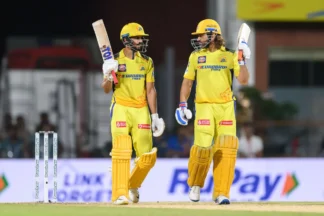The highly-anticipated RCB vs CSK match in Bengaluru might not be affected by rain after all, thanks to the drainage system at the M Chinnaswamy stadium. The match is a crucial one for both the sides as their qualification to the playoffs will be determined by the result of the game.
Rain to cause no harm to RCB vs CSK?
A video of the SubAir drainage system working efficiently to drain out a pool of water in the outfield has emerged on social media. This comes a relief to RCB fans, who are currently petrified with the forecast of rain for the day of the match.
The state-of-the-art drainage system was installed at the M Chinnaswamy stadium in Bengaluru between 2016 and 2017. It was a part of the revamp that the Karnataka State Cricket Association took up.
How does SubAir drainage system in Bengaluru work?
the SubAir system works only with sand as the main base of the ground. As a result, the conventional red-soil at the iconic field was replaced by sand to bring the working of drainage infrastructure in place.
“If you take regular soil and water, it will swell and become a lump, which does not happen with sand. The drainage system takes the water out, but in other kinds of soil, the surface moisture is retained. Sand, on the other hand, does not hold water,” P.R. Viswanathan, the BCCI’s South Zone curator was quoted as saying by ESPNCricinfo.
“It (SubAir syetem) allows water to percolate, which means the outfield is less slippery and injury risks are minimised. Sand is expensive, and you need to be very good with maintenance, especially in cool climates like Bangalore, where fungal infection is something to look out for,” he added.

Latest IPL news
On May 21, 2023, RCB vs GT went on to take place despite heavy rains before the game. The game, which commenced at 8.25 PM, saw no overs being lost as the outfield was made ready for play thanks to the SubAir drainage ssytem. GT won that particular game, chasing down the 197-run target in 19.1 overs.
Editor's Pick
 Cricket
Ajit Agarkar wanted Shubman Gill for T20 World Cup; RP Singh, Pragyan Ojha opposed
Cricket
Ajit Agarkar wanted Shubman Gill for T20 World Cup; RP Singh, Pragyan Ojha opposed

























































